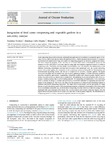Integration of Food Waste Composting and Vegetable Gardens in a University Campus

Ver/
Use este enlace para citar
http://hdl.handle.net/2183/28800
A non ser que se indique outra cousa, a licenza do ítem descríbese como Atribución-NoComercial-SinDerivadas 4.0 Internacional
Coleccións
- GI-EnQA-Artigos [16]
Metadatos
Mostrar o rexistro completo do ítemTítulo
Integration of Food Waste Composting and Vegetable Gardens in a University CampusData
2021-07-01Cita bibliográfica
Torrijos, V., Calvo Dopico, D., Soto, M., 2021. Integration of food waste composting and vegetable gardens in a university campus. Journal of Cleaner Production, 128175.
Resumo
[Abstract] Local composting (household, community and small scale applications) is considered a sustainable option for bio-waste recovery and is receiving increasing demand from society. Higher education institutions are no exception, but detailed and comprehensive long-term studies on composting programs on university campuses are lacking. The local composting program of the University of A Coruña (UDC) offers a decentralized service for the treatment of food waste from 11 university canteens using static and dynamic composters located in 9 different composting areas. Considering the three pillars of sustainability, this work describes the characteristics of the different composting technologies used and their investment and operational costs, the routine monitoring process and product quality, the integration of the composting systems as living labs for biotechnology and environmental engineering courses, and the use of compost in the university vegetable gardens. The agents involved in the project are the canteen staff, the university gardening company, external composting operators, university researchers and teachers, sustainability scholarship students and volunteer people. Organic waste is usually delivered directly by canteen staff to composters. The gardening service provides green waste from UDC campus (crushed pruning) that is used as bulking material. The monitoring and maintenance of the composting areas is currently in charge of external staff provided by a local NGO dedicated to cooperation and job reintegration of the unemployed. The service also allows the incorporation of volunteers and scholarship students as operators and process monitoring supervisors. The main result of this project was the prevention of a large amount of waste that did not require collection and transportation, or disposal or incineration. This is being done in an economically sustainable way, as decentralized composting costs have been lower than the average costs of municipal solid waste treatment in the region. The lower investment costs of static composters largely offset the higher labour costs and result in lower overall costs than those of the dynamic composter. The dissemination of composting practice to society was another important outcome of the project.
Palabras chave
Local composting
Urban agriculture
Higher education
Sustainability
Waste prevention
Urban agriculture
Higher education
Sustainability
Waste prevention
Descrición
Financiado para publicación en acceso aberto: Universidade da Coruña/CISUG
Versión do editor
Dereitos
Atribución-NoComercial-SinDerivadas 4.0 Internacional
ISSN
0959-6526






